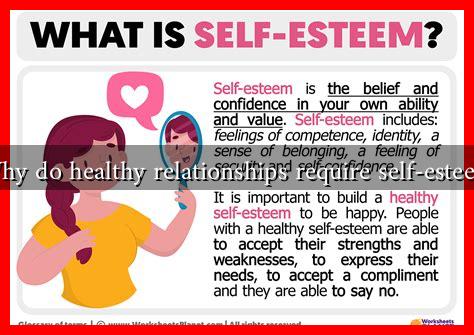-
Table of Contents
- Why Do Healthy Relationships Require Self-Esteem?
- The Role of Self-Esteem in Relationships
- Case Studies: The Impact of Self-Esteem on Relationships
- Statistics on Self-Esteem and Relationship Health
- Building Self-Esteem for Healthier Relationships
- Conclusion: The Interconnectedness of Self-Esteem and Healthy Relationships
Why Do Healthy Relationships Require Self-Esteem?
Healthy relationships are often seen as the cornerstone of a fulfilling life. They provide emotional support, companionship, and a sense of belonging. However, the foundation of any healthy relationship is self-esteem. This article explores the intricate connection between self-esteem and healthy relationships, highlighting why self-worth is essential for fostering meaningful connections with others.
The Role of Self-Esteem in Relationships
Self-esteem refers to the perception we have of ourselves, encompassing our beliefs about our worth and abilities. It plays a crucial role in how we interact with others and how we perceive our relationships. Here are some key ways self-esteem influences relationships:
- Communication: Individuals with high self-esteem are more likely to express their thoughts and feelings openly, leading to healthier communication patterns.
- Boundaries: Those with a strong sense of self-worth are better at setting and respecting personal boundaries, which is vital for mutual respect in relationships.
- Conflict Resolution: High self-esteem enables individuals to handle conflicts constructively, rather than resorting to blame or withdrawal.
- Trust and Vulnerability: A healthy self-image fosters trust and the ability to be vulnerable, essential components of deep emotional connections.
Case Studies: The Impact of Self-Esteem on Relationships
Numerous studies have demonstrated the correlation between self-esteem and relationship satisfaction. For instance, a study published in the Journal of Personality and Social Psychology found that individuals with higher self-esteem reported greater satisfaction in their romantic relationships. They were also less likely to experience anxiety and depression, which can negatively impact relationship dynamics.
Another case study involving couples therapy revealed that partners with low self-esteem often projected their insecurities onto each other, leading to misunderstandings and resentment. In contrast, couples who worked on building their self-esteem reported improved communication and a stronger emotional bond.
Statistics on Self-Esteem and Relationship Health
Statistics further underscore the importance of self-esteem in relationships:
- According to a survey by the American Psychological Association, 70% of individuals with high self-esteem reported being satisfied in their relationships, compared to only 30% of those with low self-esteem.
- A study published in the Journal of Social and Personal Relationships found that self-esteem levels were predictive of relationship longevity, with higher self-esteem correlating with longer-lasting partnerships.
Building Self-Esteem for Healthier Relationships
Improving self-esteem is a journey that can significantly enhance relationship quality. Here are some strategies to foster self-worth:
- Self-Reflection: Take time to reflect on your strengths and accomplishments. Journaling can be a helpful tool for this.
- Positive Affirmations: Use positive affirmations to challenge negative self-talk and reinforce a positive self-image.
- Seek Support: Surround yourself with supportive friends and family who uplift you and encourage your growth.
- Professional Help: Consider therapy or counseling to address deeper issues related to self-esteem.
Conclusion: The Interconnectedness of Self-Esteem and Healthy Relationships
In conclusion, self-esteem is not just a personal attribute; it is a vital component of healthy relationships. High self-esteem fosters open communication, respect for boundaries, effective conflict resolution, and emotional vulnerability. As evidenced by various studies and case studies, individuals with strong self-worth tend to experience greater relationship satisfaction and longevity.
By actively working on building self-esteem, individuals can create a solid foundation for healthier, more fulfilling relationships. Remember, the journey to self-acceptance and self-love is ongoing, but the rewards are immeasurable. Investing in yourself ultimately leads to investing in your relationships, creating a cycle of positivity and growth.

